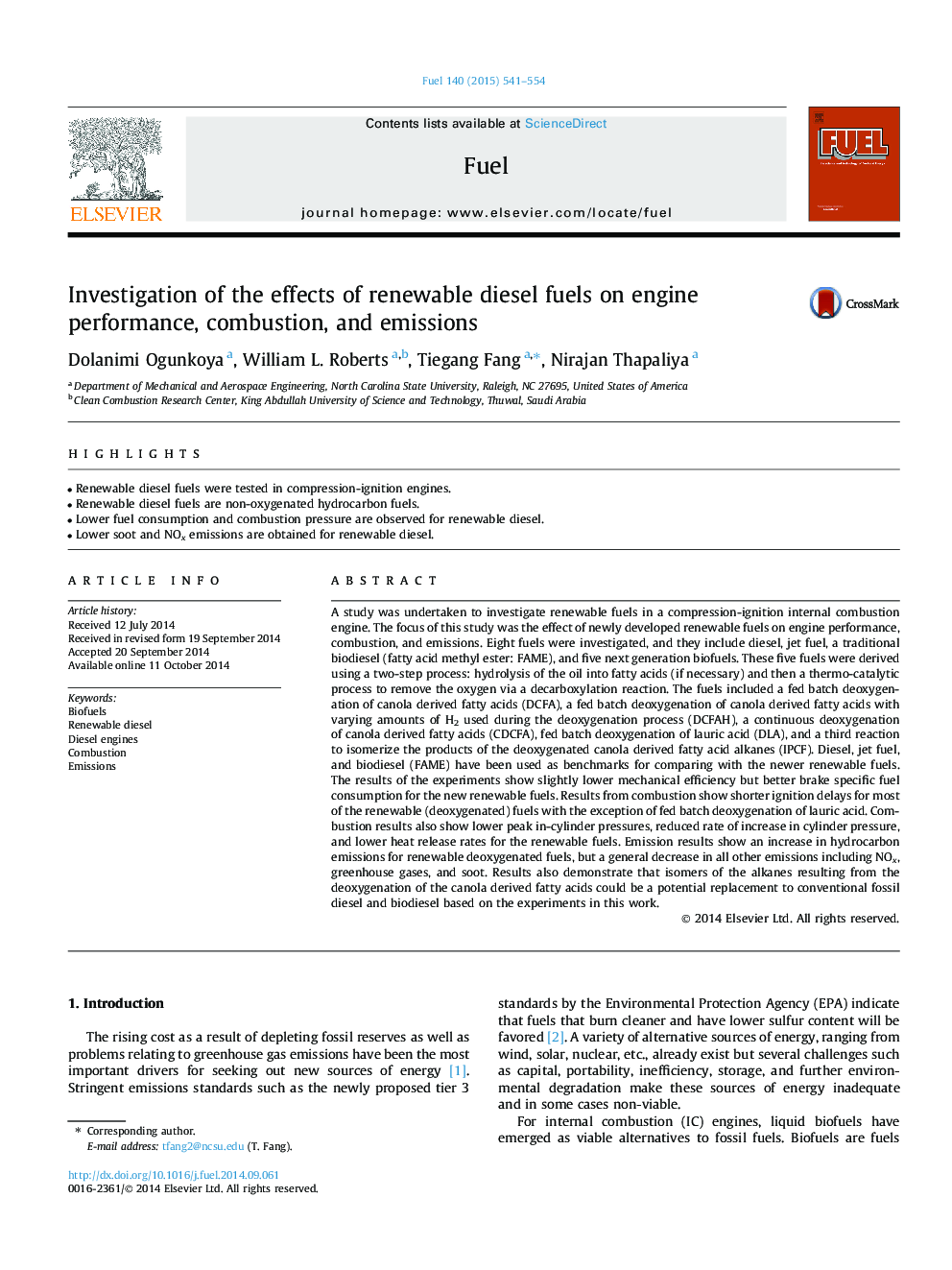| کد مقاله | کد نشریه | سال انتشار | مقاله انگلیسی | نسخه تمام متن |
|---|---|---|---|---|
| 6636334 | 461130 | 2015 | 14 صفحه PDF | دانلود رایگان |
عنوان انگلیسی مقاله ISI
Investigation of the effects of renewable diesel fuels on engine performance, combustion, and emissions
ترجمه فارسی عنوان
بررسی اثرات سوخت های تجدیدپذیر سوخت دیزل بر عملکرد موتور، احتراق و انتشار
دانلود مقاله + سفارش ترجمه
دانلود مقاله ISI انگلیسی
رایگان برای ایرانیان
کلمات کلیدی
سوخت های زیستی، دیزل تجدید پذیر، موتورهای دیزلی، احتراق انتشارات،
موضوعات مرتبط
مهندسی و علوم پایه
مهندسی شیمی
مهندسی شیمی (عمومی)
چکیده انگلیسی
A study was undertaken to investigate renewable fuels in a compression-ignition internal combustion engine. The focus of this study was the effect of newly developed renewable fuels on engine performance, combustion, and emissions. Eight fuels were investigated, and they include diesel, jet fuel, a traditional biodiesel (fatty acid methyl ester: FAME), and five next generation biofuels. These five fuels were derived using a two-step process: hydrolysis of the oil into fatty acids (if necessary) and then a thermo-catalytic process to remove the oxygen via a decarboxylation reaction. The fuels included a fed batch deoxygenation of canola derived fatty acids (DCFA), a fed batch deoxygenation of canola derived fatty acids with varying amounts of H2 used during the deoxygenation process (DCFAH), a continuous deoxygenation of canola derived fatty acids (CDCFA), fed batch deoxygenation of lauric acid (DLA), and a third reaction to isomerize the products of the deoxygenated canola derived fatty acid alkanes (IPCF). Diesel, jet fuel, and biodiesel (FAME) have been used as benchmarks for comparing with the newer renewable fuels. The results of the experiments show slightly lower mechanical efficiency but better brake specific fuel consumption for the new renewable fuels. Results from combustion show shorter ignition delays for most of the renewable (deoxygenated) fuels with the exception of fed batch deoxygenation of lauric acid. Combustion results also show lower peak in-cylinder pressures, reduced rate of increase in cylinder pressure, and lower heat release rates for the renewable fuels. Emission results show an increase in hydrocarbon emissions for renewable deoxygenated fuels, but a general decrease in all other emissions including NOx, greenhouse gases, and soot. Results also demonstrate that isomers of the alkanes resulting from the deoxygenation of the canola derived fatty acids could be a potential replacement to conventional fossil diesel and biodiesel based on the experiments in this work.
ناشر
Database: Elsevier - ScienceDirect (ساینس دایرکت)
Journal: Fuel - Volume 140, 15 January 2015, Pages 541-554
Journal: Fuel - Volume 140, 15 January 2015, Pages 541-554
نویسندگان
Dolanimi Ogunkoya, William L. Roberts, Tiegang Fang, Nirajan Thapaliya,
